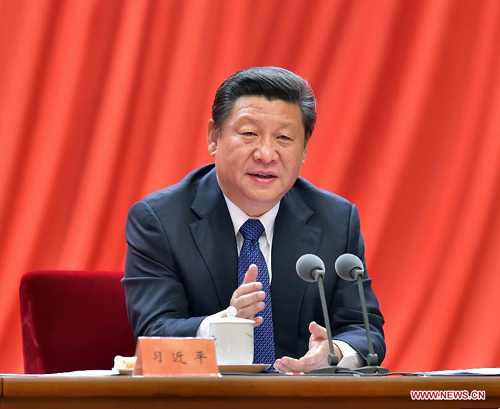'Four Comprehensives' pillars of Xism
- By John Ross
 0 Comment(s)
0 Comment(s) Print
Print E-mail China.org.cn, April 15, 2015
E-mail China.org.cn, April 15, 2015
|
|
|
Chinese President Xi Jinping, who is also general secretary of the Communist Party of China (CPC) Central Committee, delivers an important speech at the fifth plenary session of the 18th CPC Central Commission for Discipline Inspection (CCDI) in Beijing, capital of China, Jan. 13, 2015. [Xinhua/Li Tao] |
Xi Jinping's "Four Comprehensives" has created as much interest among circles in the West watching China as in China itself. The reason is clear: the "Four Comprehensives" show the way the "Chinese Dream" is not to remain in the mind but is to be turned into reality. A view from outside China of this has the disadvantage that it cannot see details, but the corresponding advantage that it forces a focus on fundamentals. Chinese readers may therefore find it useful to know why the "Four Comprehensives" created such discussion interest – forming an analysis which might be termed "Xism."
Xi Jinping always stressed that the Chinese Dream is in the interests both of China and humanity. As emphasized in his first press conference after being elected CPC General Secretary: "Our responsibility is… to pursue the goal of the rejuvenation of the Chinese nation, so that China can stand firmer and stronger among the world's nations, and make new and greater contributions to mankind."
But because China contains one fifth of humanity it can never be an ordinary country – very ordinary dreams by individual Chinese citizens have wholly extraordinary consequences for the world. Notably achieving the first "Comprehensive," a "moderately prosperous society," taking China to the threshold of a "high income" economy by World Bank standards, not only provides the rounded basis for achieving Chinese citizens' numerous needs but necessarily makes China an extremely powerful economy internationally.
For those thinking of China's interests, or humanity's, or both simultaneously, achieving the first Comprehensive is therefore today's best possible news. China's population is greater than the U.S., EU and Japan combined. China will almost double the number of people living in high income economies in the world – an immense step forward not only for China but for humanity. This is why China becoming moderately prosperous is not only decisive in achieving the "Chinese Dream" but is today the greatest step that can be taken to achieve "Humanity's Dream."
But unfortunately there are those in the world who do not think of humanity's general concerns but only of their own particular vested interests. Such forces, symbolized by U.S. "neo-con" circles, see China's comprehensive national rejuvenation not as "dream" but "nightmare."






